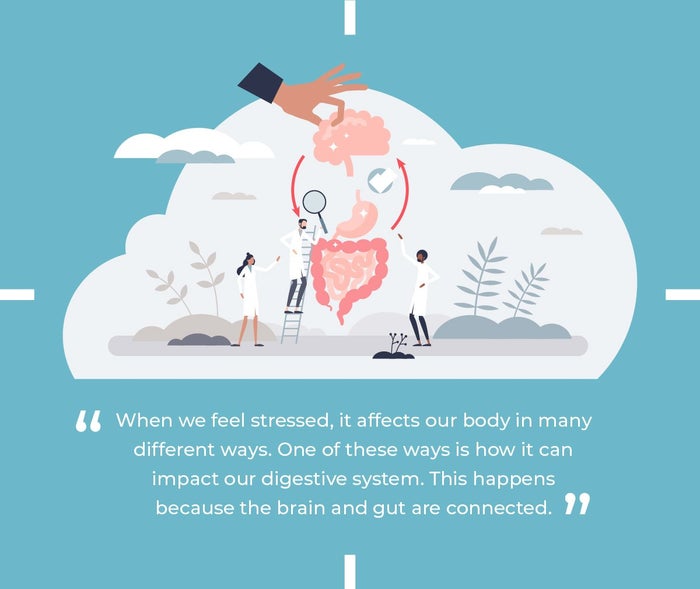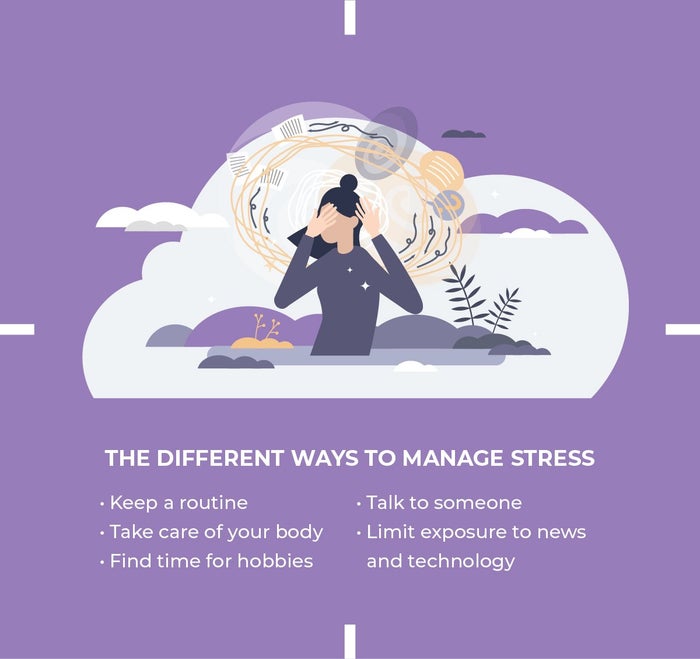How looking after your gut can help you combat stress
Stress can be brought on by several things and can affect the entire body physically, emotionally, and mentally. However, did you know your gut health can have a big impact on your stress levels? For many people, this time of year can bring a host of stressful events such as those settling into a new school year or heading off to university, and can impact them and their loved ones as they navigate this new chapter in their lives.
At PrecisionBiotics, we know the importance of looking after your gut health and how doing so can help you combat stress. To help ensure your gut health is in great condition, we will explore how stress can affect the gut, the various symptoms to look out for and discuss how stress has a direct impact on mental health. We will also provide some top tips on the different ways you can manage your stress levels.

How does stress affect the gut?
When we feel stressed, it affects our body in many different ways. One of these ways is how it can impact our digestive system. This happens because the brain and gut are connected. The sympathetic nervous system is activated by the brain when we’re in a stressful situation that requires a flight or fight response. This is to protect the body from any danger. Cortisol, which is the hormone released when we are stressed, helps prepare the body and makes it alert.
The digestive system reacts to the stress and causes the oesophagus to spasm and the acid in your stomach to increase, which can result in indigestion. You may also start to feel nauseous and the stress can even give you constipation or diarrhoea.
At times stress can also cause the blood flow and oxygen in the stomach to decrease, which can result in stomach cramps, inflammation, or an imbalance of gut bacteria.
People with gastrointestinal disorders such as irritable bowel syndrome (IBS), inflammatory bowel disease, or gastroesophageal reflux disease may find their symptoms more severe in stressful situations.
What are the symptoms of stress?
People are likely to experience symptoms of stress at various points in life, and these can range from person to person. However, there are some common signs of stress that you should be aware of as they can affect your body, mind, and behaviour.
Being able to recognise the symptoms can help you manage them. Let’s take a look at some of the common symptoms of stress.
Physical symptoms
Headaches and dizziness
Digestive issues such as nausea, diarrhoea and constipation
Aches and pains
Low energy levels
Increased heart rate and tight chest
Sleep problems such as insomnia, vivid dreams and nightmares and frequent wake-ups throughout the night
Fatigue
Sexual performance
Mental symptoms
Feeling overwhelmed and anxious
Trouble relaxing
Low self-esteem
Feeling lonely or worthless
Difficulty concentrating or forgetting things
Unable to make decisions
Behavioural symptoms
Irritated or short-tempered
A change in appetite
Procrastinating
Avoiding people or social situations
Sleeping too much or too little
Nail biting or fidgeting
How your gut health can impact your mental health
Your gut and your brain are connected physically and biochemically in several ways, and this is referred to as the gut-brain axis. This connection not only plays an important role in your overall health but your mental wellbeing too. Our emotions can often trigger symptoms in the gut, such as nausea and butterflies, which suggests that the brain and gut are both connected and that they can both affect the other.
There are billions of neurons in the brain and nervous system that tell your body how to behave, and the gut also has millions of these neurons. The neurons in the gut connect to the brain through nerves, one in particular is the vagus nerve. This nerve sends signals to the brain and the gut and plays a crucial role when you feel stressed.
There are chemicals called neurotransmitters that also connect your gut and brain. The neurotransmitters produced in the brain help control feelings and emotions. Many neurotransmitters are produced by gut cells through the trillions of microbes that can be found here. These gut microbes produce gamma-aminobutyric acid (GABA), which is a neurotransmitter that helps control fear and anxiety.
The microbes in your gut also produce short-chain fatty acids (SCFA) and these chemicals affect how your brain works. SCFA are made through digesting fibre, but they can also decrease your appetite.
An imbalanced gut microbiome (dysbiosis) can impact your physical health but it can also affect your overall mood, anxiety, depression and stress resilience. This is why a healthy, balanced gut microbiome is important for your mental wellbeing.
The good news is that probiotics and prebiotics are shown to have a positive effect on mood disorders such as stress, anxiety, and depression. One particular probiotic supplement is Zenflore®, which has been carefully formulated to support your mind and body. What are some of the benefits of Zenflore®?
Contains B vitamins that assist with reducing tiredness and fatigue
The B vitamins also support mental performance
Zenflore® can be taken as part of a healthy diet to support the gut microbiome
Encourages serotonin production in the gut to promote a positive mood

The different ways to manage stress
We all experience stress from time to time when we find ourselves in challenging situations, but it’s important to find ways to manage your stress to avoid it taking a toll on your physical and mental health. Here are some ways you can manage your stress levels:
Keep a routine
Structure and predictability can lead to better mental health and reduce stress. Even keeping to regular mealtimes throughout the day can be beneficial to your gut.
Take care of your body
Exercise, eating healthy, getting plenty of sleep, and taking supplements like Zenflore® are great ways to take care of your mental, physical and emotional health.
Find time for hobbies
Ensure you find the time to do more of the things you enjoy. By doing something each day that gives you joy, you will notice a difference in your overall mood and stress levels.
Talk to someone
Sharing your feelings and concerns with someone can give you the support and insight that can help relieve stress.
Limit exposure to news and technology
Overexposure to the news and technology can impact your mental health. Consider reducing the time you spend on devices and the amount of news you take in each day.
Understanding how stress and gut health can impact your mind, body and behaviour can help you take action to prevent it from worsening. Knowing the different stress symptoms and the ways in which you can relieve stress such as taking probiotic supplements and following a healthy diet can keep the stress levels at bay and your gut bacteria balanced.
Sources:
https://www.nhs.uk/mental-health/feelings-symptoms-behaviours/feelings-and-symptoms/stress/https://www.mind.org.uk/information-support/types-of-mental-health-problems/stress/signs-and-symptoms-of-stress/https://www.everydayhealth.com/wellness/united-states-of-stress/how-stress-affects-digestion/https://www.bupa.co.uk/newsroom/ourviews/can-gut-health-affect-mental-healthhttps://www.healthline.com/nutrition/gut-brain-connectionhttps://atlasbiomed.com/blog/9-ways-gut-bacteria-and-mental-health-probiotics-and-depression-are-linked/#microbiome-compositionRelated Articles







